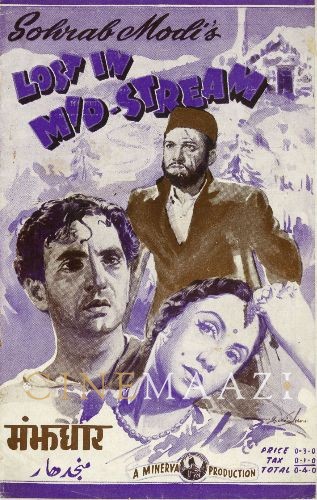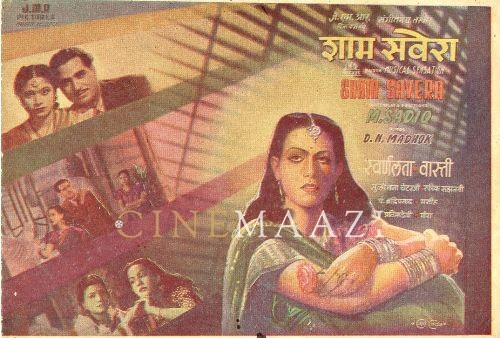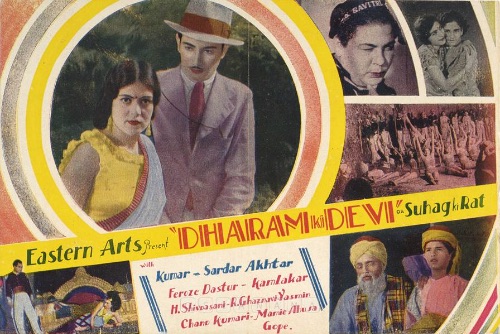Rafiq Ghaznavi

Subscribe to read full article
This section is for paid subscribers only. Our subscription is only $37/- for one full year.
You get unlimited access to all paid section and features on the website with this subscription.
Not ready for a full subscription?
You can access this article for $2 , and have it saved to your account for one year.
- Real Name: Mohammad Rafiq
- Born: 1907 (Rawalpindi, Punjab, British India)
- Died: 2 March, 1974 (Karachi, Sindh, Pakistan)
- Primary Cinema: Hindi
- Spouse: Anwari Begum, Zehra
- Children: Shahina, Nasreen, Murad
Music composer and actor, Rafiq Ghaznavi was a multifaceted talent of the early years of Hindi cinema. As a composer he had approximately 30 films to his credit, such as Behan Ka Prem (1935), Do Auraten (1937), Actress Kyun Bani (1939), Bahurani (1940), Prithvi Vallabh (1943), Chal Chal Re Naujawan (1944), Laila Majnu (1945), Ek Din Ka Sultan (1945), Parwaaz (1954), and Mandi (1956). He also featured as an actor in films such as Sarfarosh (1930), Roshan Ara (1932), Heer Ranjha (1932), Jawani Diwani (1934), Prem Pujari (1935), Do Auraten, Chalti Duniya (1940), Sham Savera (1946), and Manjhdhar (1947). He also directed the film Wah Rahe Zamane (1958). He was known to be a larger than life personality, both on and off screen
He was born Mohammad Rafiq in 1907 into an aristocratic family of Rawalpindi, now in Pakistan. His family originally hailed from Ghazni in Afghanistan, later migrating to Lahore. A graduate from Punjab University, he fluently spoke languages such as Urdu, Persian, and Punjabi, which he preferred. His interest in cultural activities saw him perform at events during his college days. Pursuing his passion for music, he acquired training in classical music from Ashiq Ali, Asif Ali and Allah Baksh of the Patiala Gharana. He soon became popular as a singer in Lahore.
His break in films came when, in 1930, director A R Kardar, who was scouting for new faces for his silent film Sher Dil, signed him for the film. He was repeated again in Kardar’s Heer Ranjha (1932), in which he essayed the role of Ranjha opposite Anwari Begum who played Heer. The film was originally titled Hoor Punjab, before it was later changed. Incidentally, it was while shooting this film that he and Anwari fell in love, and later eloped and moved to Bombay.
With offers for acting as well as music composition coming his way, he juggled both. He composed the music for J K Nanda's Pavitra Ganga (1932). It was followed by Bharat Movies' Roshan Ara. He played the lead and also sang in this G R Sethi directorial, which had music by Master Mohammad. The following year, he scored the music for the historical Prithviraj Sanyogita (1933). Essaying the part of the court poet, Chand Bardai, he also composed a song in the Rajasthani Bhatt style - Prithviraj jidhar tegh udha lete hain shoorveer udhar sheesh nawa dete hain.
He also rendered a few songs in Jawani Diwani (1934), such as Husn ne seekhi gareeb ajarian, Dil ko behkaun kahan tak ki bahalta hi nahi and Kavan ban aayie momanat bhai. In 1935, he worked in two films namely Behan Ka Prem and Prem Pujari. Besides playing the lead, he wrote the story, screen dialogue and also sang his compositions in the film. Zakhm mere dil-e-sojan ke siye jate hain, Mujh se chhip kar mere armano ko barbad na kar and Tere naazon ne mara sanam were among the popular songs in the film.
For the film Kaun Kisi Ka (1939), he composed songs such as Badariya hole hole dol, Le lo albele bele ke haar, Phool le lo Phool and the duet Main bagh ki sunder titli. Featuring in the multi-starrer Sitara (1938), directed by Ezra Mir, he was part of the star cast that included Ratan Bai, Khursheed, Nazeer and Mubarak. He rendered the traditional wedding song Ab banega hamar banna, as well as Main sadqe tere, Arman bade dil, Aaja aaja aaja pritam aaja, Nahi batati nahi batai, Mere prem ka panchi and Saajan gaiye kis ore. His duet with Khursheed - Tasveer banana wale taqdeer bana de meri was widely appreciated.
His compositions in Apni Nagariya (1940) saw him display a different style as a music composer. He rose to the challenge of creating tunes that matched the theme of the film, which was based on a short story by Manto – Keechad. The film, starring Shobhna Samarth, Nazeer, Jayant and K N Singh, included his compositions such as Majdoor majdoor jevan hai tera pyaara, Mori bagiya mein aaiy maal, Dhool sekho tasa dekho London ka tamasa dekho, Ae mitti ki maya teri sone ki kaya, Pardesh musafir chood chale, Main wo ream hoon jo kuchal gaya, Duniya na hui kisi ki, Door maya se ho door bawre and Mitti ko sish chadhayange. The songs became very popular.
Working on Sohrab Modi's magnum opus Sikandar (1941), he composed the marching song Zindagi hai pyaar se bitaye jaa. The same year, he worked again with A R Kardar in Swami (1941), followed by Society (1942) and Kalyug (1942) for which he composed romantic tunes. The following year, he scored music for Duhai (1943), along with composers Panna Lal Ghosh and Shanti Kumar. His popular compositions Ab mast jawani aaiye and Bade bewafa hain mard were rendered by Noorjehan.
He went on to score the music for Mehboob Khan’s Najma (1943). He also recited a Syed Ghulam Muhammad-composed couplet – Muddai laakh bura chaye to kya hota hai, hota hai wahi jo manjoor-e-khuda hota hai. His work left a very favourable impact on the filmmaker, who signed him for his next film Taqdeer (1943) as well.
For Ek Din Ka Sultan (1945), he scored the single Hum bahisht ke malik, hum jahan ke naukar. The same year, he composed for S Nazeer's Laila Majnu (1945), scoring popular compositions such as Fariyaad kyun meri jawani per tujhe rahem na aaya and Kya sitam hai jurm hai.
Moving to Pakistan in 1947, he migrated to Lahore and later moved to Karachi. He composed music for director Ashfaq Malik's film Parwaaz (1954) and director Aziz Ahmed's film Mandi (1956). Deciding to quit films, he joined Radio Pakistan and dedicated himself to scoring music for radio programmes. He continued to be active in the realm of music, to which he made a significant contribution.
Rafiq Ghaznavi passed away on 4 March, 1974. He was 67.
-
Filmography (7)
SortRole
-

Manjdhar 1947
-

Sham Savera 1946
-












.jpg)



